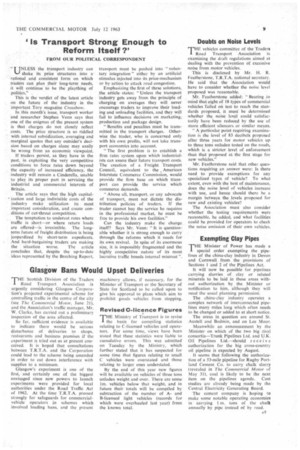Is Transport Strong Enough to Reform Itself?'
Page 11

If you've noticed an error in this article please click here to report it so we can fix it.
FROM OUR POLITICAL CORRESPONDENT
"TNLESS the transport industry can
‘s-i shake its price structures into a rational and consistent form on which traders can plan their long-term needs, it will continue to be the plaything of politics."
This is the verdict of the latest article on the future of the industry in the important Tory magazine Crossbow.
In this month's issue, transport worker and researcher Stephen Venn says that one of the enigmas of the present system is that charges do not closely reflect costs. The price structure is so riddled with internal subsidization, averaging and marginal quotes that any outsider's decision based on charges alone may easily be wrong from an economic viewpoint.
If traders persist, as they have in the past, in exploiting the very competitive conditions to force rates down beyond the capacity of increased efficiency, the industry will remain a Cinderella, unable to play its proper part in servicing the industrial and commercial interests of Britain.
The article says that the high capitalization and large indivisible costs of the industry make utilization its most important consideration, and create conditions of cut-throat competition.
The temptation to undercut rates where traffic is short—or where return loads are offered—is irresistible. The longterm future of freight distribution is being jeopardized by short-term expedients. And hard-bargaining traders are making the situation worse. The article concludes that, despite the up-to-date ideas represented by the Beeehing Report, transport must be pushed into " voluntary integration" either by an artificial stimulus injected into its price-mechanism or by action to attack road congestion.
Emphasizing the first of these solutions, the article states: " Unless the transport industry gets away from the principle of charging on averages they will never encourage traders to improve their loading and unloading facilities, and they will fail to influence decisions on marketing, production and package design.
"Benefits and penalties roust be transmitted in the transport charges. Otherwise the trader, who is concerned only with his own profits, will not take transport economics into account.
"The first problem is to establish a firm rates system upon which industrialists can assess their future transport costs. The creation of a Freight Transport Council, equivalent to the American Interstate Commerce Commission, would provide the firm base on which transport can provide the service which commerce demands.
"Above all, transport. or any advocate of transport, must not dictate the distribution policies of traders. If the trader cannot buy the service he requires in the professional market, he must be free to provide his own facilities."
Can the industry make the change itself? Says Mr. Venn: " It is questionable whether it is strong enough to carry through the reforms which it needs for its own revival. In spite of its enormous size, it is impossibly fragmented and the highly competitive nature of its most lucrative traffic breeds internal mistrust ".




















































































































